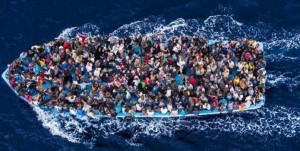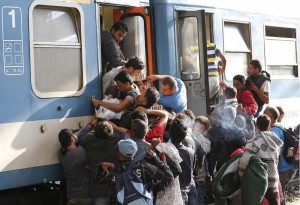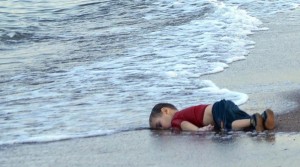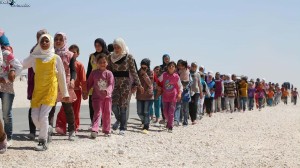Refugees are not a new phenomenon but they have suddenly emerged as a Central part of our news and awareness. What has changed?
The refugee crisis emerged seemingly out of nowhere during the summer of 2015 – at least in terms of news coverage. Was the photo of Alan Kurdi on the beach really that consequential or was it the arrival of the problem into ‘our space’? Is the problem new, different and permanent?
The UNHCR reports there are 15,000,000 officially registered refugees and another 45,000,000 in refugee-like situations. This is the largest number since World War II. Although slightly smaller, there have been similar numbers for decades – what has changed?
We are also dealing with new terminology. In addition to refugees we now speak of immigrants, economic migrants, victims of climate change, ‘illegal migrants’ and ‘undocumented migrants’.
Is there a solution to the refugee dilemma?
Refugees cross the Mediterranean with their children in over-crowded boats stating that staying on the land is more dangerous than the risk of the sea.
 I am reminded of the Leonard Cohen lyric – “There is no decent place to stand in a massacre…”
I am reminded of the Leonard Cohen lyric – “There is no decent place to stand in a massacre…”
I will suggest that the altered global system of political organization plus the impact of access to information technology plus population pressures have created entirely new circumstances. These are unlikely to change in a direction that will reduce the ability and urge to migrate. This leaves the question of whether the world can manage this new reality and the consequences of this reality.
Einstein was a refugee. Jesus was a refugee and so were the pilgrims on the Mayflower. When the refugee becomes a real person rather than a category it seems different.
On a very personal note my grandparents, my mother, my father and both daughters were refugees. My stepmother survived the Soviet gulag and later defected from the USSR – my son-in-law was born in the gulag. Those of us with a refugee pedigree should find it easy to demonstrate sympathy and generosity to the victims of today – and those whose family had the good fortune to avoid these challenges should be generous out of gratitude. Unfortunately this is not always the case.
Getting a little political – If some of the Republican Presidential candidates had been in authority in Bethlehem they would have stopped Joseph and Mary at the city gates, never mind a little space in the stable….
War, violence, poverty and famine are certainly not a novelty of the 20th century but the world was organized very differently until the 1960’s – a difference which has a profound impact on the nature and flow of migrants. Most of the non-European world pre WWII was organized into colonial Empires. Governments may have been cruel, exploitative and even dysfunctional from the perspective of the locals – but this was of no consequence since there were few opportunities for geographic mobility. A victim of exploitation or natural disaster in the Belgian Congo would hardly be welcome in Belgium and probably even less so in other developed nations.
The post-colonial world released demons such as tribalism, racism, religious divisions and political ideology – or at least made them consequential. These contributed to discrimination, violence and poverty and unsurprisingly produced refugees. At the same time the end of colonialism hardened borders – many of them artificial and inappropriate. These factors plus increasing population created the push. Advances in transportation, communication and information allowed desperate people to note the differences in their circumstances and prospects – that created the pull toward the more developed, safer, prosperous and generally more tolerant world.
These new circumstances are matched with increasingly narrow views of citizenship and sovereignty. Immigration policies have become more rigid. Old and new forms of xenophobia are finding their way into public discourse and the political domain.
These changes in how the world is organized plus the emerging pressures create the setting for the immigration stories and events that have assaulted our public space and discussion. Add a few social or political catastrophes like Syria, Somalia, Afghanistan and a few others and the situation spins out of control.
Europe had a different experience and history. The global dominance of Europe allowed its population to move moderately freely within Europe but even more important its citizens could escape the wars, population pressures and other dysfunctional events by emigrating. This resulted in the development of a “European” world beyond Europe including the Americas and outliers like Australia. For reasons beyond the scope of this essay the European world emerged (after plenty of experiments with religious wars and unhelpful ideologies) as the most prosperous and overall as tolerant, liberal and open societies. Although movement of people was substantial, most migrants were racially and culturally similar to each other.
WWII created a gigantic refugee crisis but most movement remained within regions or historic patterns. Following that war there were several very significant refugee events but they barely registered on the conscience of the Western World. The Partition of India in 1948 resulted in the relocation of 14,500,000 people (or over 40,000,000 as a proportion of the global population relative to 2015). The Bangladesh Civil War of 1970 resulted in 10,000,000 refugees and there were other events – but international relocation on a large scale was never considered.
Several conditions or events began to change the pattern. France accepted immigrants from North Africa as its colonial policies collapsed resulting in the presence of a population that did not integrate easily. Germany instituted its “Gastarbeiter” policy and invited workers from Spain, Italy, Greece and Turkey. Most of the first three groups returned home with increasing prosperity while the Turkish population stayed and brought more of their less educated and cultured Anatolian cousins. Policy failures and cultural reasons resulted in the assessment by Angela Merkel in 2014 that “multiculturalism does not work”. The UK inherited a variety of new citizens from its vast array of former colonies.
North America faced a changing migrant world where Europeans no longer felt compelled or interested to relocate in large numbers. At the same time both Canada and the US changed to more or less color-blind selection policies. Certain regions and cities such as San Francisco, Toronto or Vancouver have become radically and racially different over the last 50 years as a result of these policy changes.
Several changes or events combined or conspired to create the conditions and mindset for the current refugee crisis.
1. The failed state syndrome
The independence of former colonies did not assure economic success or governance that addressed the needs of the people. This resulted in significant populations facing civil war or poverty that was interpreted as the problem of their leadership and escape to another jurisdiction became a possible answer.
2. The boat people phenomenon
The VietNam War and its consequences struck a global chord that was different than most earlier refugee emergencies. The United States became engaged whether through guilt or altruism and was joined by Canada and several other countries. The result was a magnificent act of generosity and an example of successful relocation of a major population. The Balkan War in some sense was a parallel situation for Europe.
3. Latin America and Mexico
The Movement of population from countries of Latin America and the Caribbean to the USA and Canada has been substantial. There are various currents such as the highly politicized immigration of Cubans into the USA. Poverty and internally and externally driven political events have resulted in substantial movement of people around the Americas. One effect was to politicize what had been a more normal and functioning informal labor movement between Mexico and the USA.
4. The Arab Spring appeared unexpectedly and raised hopes of genuine change in the illiberal governance of the Middle East. The toxic combination of historic Islamic Divisions, the absence of democratic traditions, a century of meddling by the West plus tribalism, oil and intransigent leaders produced the catastrophes with labels like Libya, Syria and Iraq.
5. The access to the Internet and modern information systems created conditions where events could metamorphose into mass movements that could spin out of control.
These various events and prior sensitizing or radicalizing of populations and politics conspired to create the mass movement of refugees into Europe in 2015. Undocumented refugees from war zones and economic immigrants had been arriving in Europe for many years but the numbers and context were manageable. In the meantime Europe had been developing on a unifying and liberalizing track including developments such as Shengen that had never anticipated anything like the refugee events of 2015.
Is there a solution?
The push factor can be expected to become more severe. There is no sign that the failed states, war zones or areas of economic deprivation will change to the degree that the source of migrants or refuges is decreased.
The pull factor is also unlikely to diminish. Jobs, prosperity, safety and a hope of a future for their children are the factors that motivate migrants – that difference in reality and perception is unlikely to diminish.
Population pressures are a factor and will not go away. Countries that produce migrants including Ethiopia, Nigeria, Syria and Congo have seen their already large populations increase by more than 500% since 1950 and grow more than 200% since 1980. In contrast the group of China, USA and Canada have grown by 40% in the last 35 years while Germany, Poland and Russia have had virtually no growth. Mathematics will simply not permit relocation of affected populations to be more than a relatively symbolic part of any solution.
Any massive relocation of population requires a successful transition in recipient countries to a multicultural society that works. Canada represents a hopeful if not perfect example. The USA has exhibited success in absorbing different populations and cultures but recent events indicate a reduction in the ability and willingness of its population and politics to consider a more multicultural and differentiated population as positive.
That leaves the United Nations or more specifically the UNHCR – my former employer when I was head of their program in Somalia – as the instigator and manager of the resettlement of the most vulnerable. The reality is that total annual official international resettlement has been in the range of 75,000 per year or barely a dent in the 15 or 45 million in trouble. The unusual acceptance of refugees by Germany may create some different numbers but the jury is out whether that rate of immigration can be sustained by Germany or any country.
Generosity toward a specific visible group of refugees (Syrians) by Canada and Germany is commendable but it would only take a variation of the Paris attacks to destroy that acceptance and welcome by the population and therefore the Governments.
Is there a solution?
The United Nations recently passed a new set of development goals to replace the original Millennium Goals. While imperfect they reflect idealism and a positive view of the future. Migration locally, regionally or internationally is nothing new and will and should remain a reality. However, migration on a massive international scale cannot be the solution to every problem of a failed state, civil war, failure to manage population or bad governance.
The world in all its imperfection will need to address the root causes which begin with bad Governance followed by inappropriate development policies to create conditions which make it reasonable and possible for people to remain in the country of their birth. The current and unexpected migration emergency in Europe may stir Governments to take a more serious look at their engagement with the countries that produce the migrants and refugees.
 The causes of migration go well beyond development and include religious issues such as an Islam that is struggling to come to terms with modernity, climate change, our reliance on resources such as oil and others. The nature of the debate needs to change from xenophobia and fear to a positive and constructive approach to a better world – but that is asking something of politicians and religious leaders that is difficult to visualize.
The causes of migration go well beyond development and include religious issues such as an Islam that is struggling to come to terms with modernity, climate change, our reliance on resources such as oil and others. The nature of the debate needs to change from xenophobia and fear to a positive and constructive approach to a better world – but that is asking something of politicians and religious leaders that is difficult to visualize.
Whatever the challenges as indicated, there will be a growing movement of populations and increasingly these will have the character of greater diversity of race and religion. This will require a more constructive understanding of multiculturalism. We need to develop strategies to make all societies more tolerant and inclusive. This includes those in Islamic or other societies that are currently highly resistant to such ideas.
Do we have reason to be hopeful about the refugee dilemma?
The ‘world’ will find some way to manage the current uncontrolled movement of people but I suspect it will not be pretty and will not end the problem. The nature of the post-colonial world combined with notionally acceptable human rights standards create conditions where people are able to migrate and have reason to do so.
Nothing will solve the problem better than Peace within and between countries plus good Governance. The Nobel prize-winning economist Amartya Sen famously made the statement that famines never occur in democratic countries – in other words good Governance creates the capacity to manage difficult situations.
The other pre-condition for management of migration is a greater ability to develop societies that can be successfully multicultural. This requires more than the willingness of receiving societies to be tolerant of others – it will also require entities like Islam to accept and encourage their adherents to adjust to the societies in which they find themselves rather than transport attitudes and rigidities from somewhere else.
Conclusion
Refugees and the problem of uncontrolled migration emerged into the public perception in 2015 but should not have been a surprise. It was convenient for the world and specifically Europe to ignore this growing problem and to avoid dealing with the difficult issues that created the refugees until they appeared inside ‘our space’. Canada is commendable in its acceptance of 25,000 Syrians but we need to remember how geography protects us. The attitudes of the USA as exhibited in public discourse are of greater concern since they prejudice the ability to develop a future consensus in the American population. European response reflects its internal problems and the challenge of responding as a unified entity.
The refugee dilemma will become a semi-permanent feature since the drivers of migration have not begun to be resolved. At this stage policies to manage the problem will be the first response. We can already see this in the proposal of the EU to massively increase support to Turkey to improve conditions of the refugees inside its borders and reduce their urge to relocate.
The refugee dilemma has become visible and its dimension better understood – but solutions are partial, temporary and often ad hoc. The dilemmas of refugees and economic migrants searching for security and a better life will be a continuing feature of our global reality.





